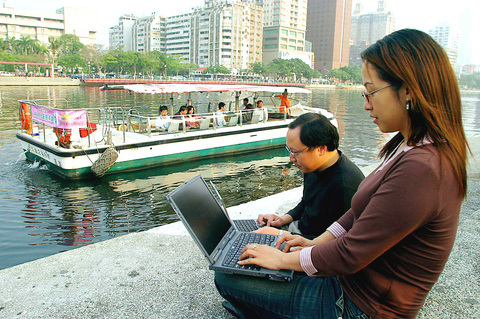Claiming to be the nation's first "real" mobile city, Kaohsiung City yesterday inaugurated wireless Internet connections in parts of the city to provide free access in the public.
"I believe the wireless infrastructure will bring more benefits to our people and visitors," Kao-hsiung Mayor Frank Hsieh (

PHOTO: CHANG CHUNG-YI, TAIPEI TIMES
Hsieh tested the system while riding a boat on Kaohsiung's landmark Love River, and he said "the result is excellent ... the connection speed is faster than the broadband system I use at home."
The wireless service is currently available in or near the city government building, the City Council, the Cultural Center and Hsinkuang Wharf, said Tony Wu (吳國棟), chief operation officer of Easpnet Taiwan Inc (數位通國際網路). Easpnet became the contractor for the project after winning the bid in October.
By the end of next April, the service will be extended to downtown Lingya, Shinshing and Chienchin Districts. Kaohsiung's other eight districts will receive the service by the end of next year, giving the city 80 percent coverage, Wu said.
The mobile city project will cost the Kaohsiung City Government an estimated NT$93 million, Wu said. The service will be free for one year after the entire project is completed, or from the end of next year, he said.
The system will also be used to improve security. The wireless connection is linked to monitoring systems set in crossroads, a digital fire alert system, and a vehicle tracking system, which allows the police force and fire department to obtain information instantly.
The Taipei City government also has a similar plan to bring wireless connection to the whole city by the end of next year.
The government is currently testing the system in the area around the Taipei City Government building in Hsinyi District. By the end of this year, the service will be officially launched along 20 Mass Rapid Transportation stations.
The wireless infrastructure, however, has reportedly been less well received than expected by Taipei residents due to compatibility problems.
The Taipei City Government contracted different companies to build the wireless system in different areas. State-run Chunghwa Telecom Co (中華電信) covers the general Hsinyi District, Qware Systems Inc (安源資訊) is in charge of MRT stations, while restaurants and coffee shops have their own wireless service providers, forcing users to apply for another user account when they enter another area.
One official at Easpnet who did not want to be named said this problem will not occur with Kaohsiung's wireless network. However, he acknowledged that access there is still not completely stable due to signal interference in the area.
The company will streamline this later to make the system run more smoothly, he said.

Intel Corp chief executive officer Lip-Bu Tan (陳立武) is expected to meet with Taiwanese suppliers next month in conjunction with the opening of the Computex Taipei trade show, supply chain sources said on Monday. The visit, the first for Tan to Taiwan since assuming his new post last month, would be aimed at enhancing Intel’s ties with suppliers in Taiwan as he attempts to help turn around the struggling US chipmaker, the sources said. Tan is to hold a banquet to celebrate Intel’s 40-year presence in Taiwan before Computex opens on May 20 and invite dozens of Taiwanese suppliers to exchange views

Application-specific integrated circuit designer Faraday Technology Corp (智原) yesterday said that although revenue this quarter would decline 30 percent from last quarter, it retained its full-year forecast of revenue growth of 100 percent. The company attributed the quarterly drop to a slowdown in customers’ production of chips using Faraday’s advanced packaging technology. The company is still confident about its revenue growth this year, given its strong “design-win” — or the projects it won to help customers design their chips, Faraday president Steve Wang (王國雍) told an online earnings conference. “The design-win this year is better than we expected. We believe we will win

Chizuko Kimura has become the first female sushi chef in the world to win a Michelin star, fulfilling a promise she made to her dying husband to continue his legacy. The 54-year-old Japanese chef regained the Michelin star her late husband, Shunei Kimura, won three years ago for their Sushi Shunei restaurant in Paris. For Shunei Kimura, the star was a dream come true. However, the joy was short-lived. He died from cancer just three months later in June 2022. He was 65. The following year, the restaurant in the heart of Montmartre lost its star rating. Chizuko Kimura insisted that the new star is still down

While China’s leaders use their economic and political might to fight US President Donald Trump’s trade war “to the end,” its army of social media soldiers are embarking on a more humorous campaign online. Trump’s tariff blitz has seen Washington and Beijing impose eye-watering duties on imports from the other, fanning a standoff between the economic superpowers that has sparked global recession fears and sent markets into a tailspin. Trump says his policy is a response to years of being “ripped off” by other countries and aims to bring manufacturing to the US, forcing companies to employ US workers. However, China’s online warriors